Joe Cocker Dies At 70
Joe Cocker, whose gravely voice became iconic after covering The Beatles at Woodstock some 45 years ago, has died at the age of 70:
Joe Cocker, the gravelly British singer who became one of pop’s most recognizable interpreters in the late 1960s and ’70s with passionate, idiosyncratic takes on songs like the Beatles’ “With a Little Help From My Friends,” died on Monday at his home in Crawford, Colo. He was 70.
The cause was lung cancer, his agent, Barrie Marshall, said.
Mr. Cocker had been a journeyman singer in Britain for much of the 1960s, building a reputation as a soulful barreler with full-throated versions of Ray Charles and Chuck Berry songs. But he became a sensation after his performance of “With a Little Help From My Friends” at the Woodstock music festival in 1969.
His appearance there, captured in the 1970 concert film “Woodstock,” established him as one of pop’s most powerful and irrepressible vocalists. With his tie-dyed shirt and shaggy mutton chops soaked in sweat, Mr. Cocker, then 25, pleadingly teased out the song’s verses — “What would you do if I sang out of tune?/Would you stand up and walk out on me?” — and threw himself into repeated climaxes, lunging and gesticulating in ways that seemed to imitate a guitarist in a heroic solo.
On Twitter, Ringo Starr wrote on Monday, “Goodbye and God bless to Joe Cocker from one of his friends.” In a statement, Paul McCartney recalled hearing Mr. Cocker’s record of the song. “It was just mind-blowing, totally turned the song into a soul anthem,” he said, “and I was forever grateful for him for having done that.”
After Woodstock, Mr. Cocker toured widely and took his place as perhaps the rock world’s most distinctive interpreter of others’ songs — an art then going out of fashion with the rise of folk-inspired singer-songwriters and groups, like the Beatles, that wrote their own material.
His other hits included a version of the Box Tops’ hit “The Letter” and the standard “Cry Me a River,” both in 1970, and “You Are So Beautiful,” in 1975. His only No. 1 single was “Up Where We Belong,” recorded as a duet with Jennifer Warnes for the 1982 film “An Officer and a Gentleman,” for which he won his only Grammy Award.
Almost from the start of his fame, Mr. Cocker struggled with alcohol and drug addiction.
“If I’d been stronger mentally, I could have turned away from temptation,” he said in an interview last year with The Daily Mail, the British newspaper. “But there was no rehab back in those days. Drugs were readily available, and I dived in head first. And once you get into that downward spiral, it’s hard to pull out of it. It took me years to get straight.”
His early tours — particularly “Mad Dogs & Englishmen” in 1970, which was documented in a live album and film of the same name — were rowdy affairs, awash in both drugs and the artistic excesses of the era. The sprawling “Mad Dogs” entourage included not only more than 30 musicians, among them the keyboardist and songwriter Leon Russell and the drummer Jim Keltner, but also spouses, babies and pets.
At the same time, Mr. Cocker’s onstage contortions had, for better or worse, become his signature. John Belushi performed a sendup on “Saturday Night Live” in 1975 that ended with his convulsing on the floor; the next year Mr. Cocker performed Traffic’s “Feelin’ Alright” on the show, joined by Mr. Belushi in imitation.
(…)
John Robert Cocker was born on May 20, 1944, in Sheffield, England, and began playing drums and harmonica in 1959 with a group called the Cavaliers. Influenced by Ray Charles and skiffle stars like Lonnie Donegan, he soon switched to lead vocals and rebranded himself Vance Arnold — a name inspired by both the American country singer Eddy Arnold and a character from the Elvis Presley film “Love Me Tender.”
While still a budding teenage performer, Mr. Cocker had kept his day job as a gas fitter for the East Midlands Gas Board. He was given a six-month leave when he signed with Decca in 1964. But his version of the Beatles “I’ll Cry Instead” and a tour slot opening for Manfred Mann drew little notice, so he went back to gas fitting for a time.
Mr. Cocker’s career began to take shape around 1965 when he and the keyboardist Chris Stainton formed the Grease Band, which played Motown covers in pubs throughout northern England before relocating to London two years later. In 1968, the group’s single “Marjorine,” released under Mr. Cocker’s name, became a minor hit, and a version of “With a Little Help From My Friends” — with Jimmy Page on guitar and B. J. Wilson, from Procol Harum, on drums — went to No. 1 in England.
Woodstock made Mr. Cocker a worldwide star, but throughout the 1970s his career was dogged by problems with drugs. He sometimes forgot the words to songs onstage, and while on tour in Australia in 1972 he was arrested on a charge of possession of marijuana.
“Up Where We Belong” resuscitated Mr. Cocker’s career in 1982, leading to numerous other songs in film soundtracks, among them Randy Newman’s “You Can Leave Your Hat On” in “9 1/2 Weeks” (1986) and “When the Night Comes,” from “An Innocent Man” (1989), which went to No. 11 on Billboard’s pop chart.
Meanwhile, Mr. Cocker was reaching millions of younger fans as the Woodstock version of “With a Little Help From My Friends” was used as thetheme song for the ABC comedy series “The Wonder Years,” which started in 1988. He performed at Woodstock ’94, the 25th-anniversary version of the festival.
As always, the best way to remember a musician or singer is through their music so here’s Cocker’s iconic Woodstock performance:
And, here’s the same song some 33 years later, at the Queen’s Golden Jubilee with Phil Collins on drums and the great Brian May on guitar:
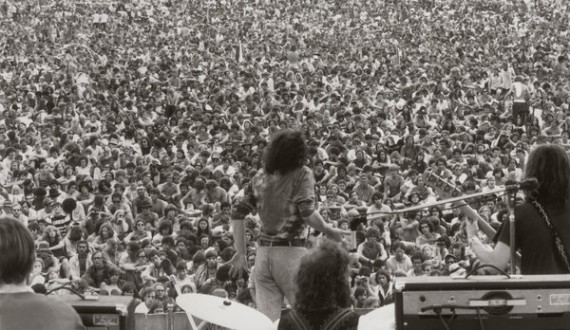

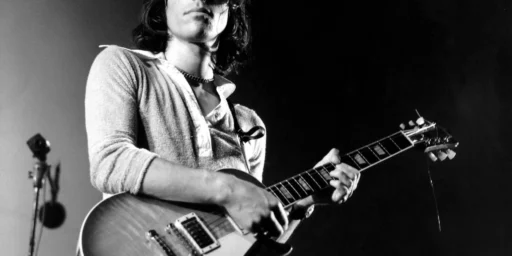
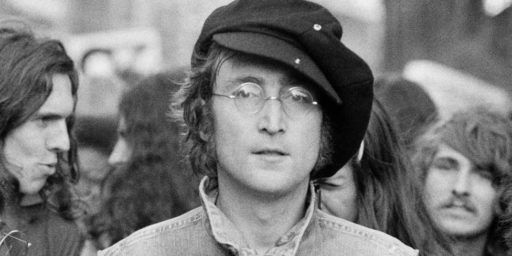
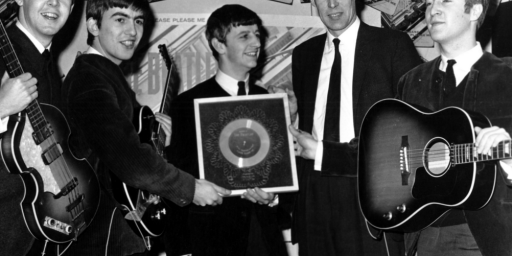
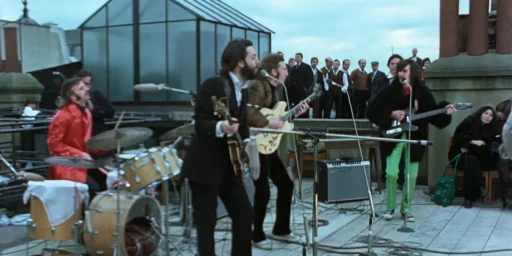

Probably one of the few things my X wife and i had in common was our love of Joe Cocker. He was only about a year older than me which gives me something to think about
As the son of two huge Beatles fans–and a Beatle fan myself–I have to say that nobody could cover the Beatles like Joe Cocker. NOBODY. He would actually take the songs and improve them, giving them soul. Most Beatle covers are lucky to be even passable. In addition to With a Little Help From My Friends, his cover of She Came In Through the Bathroom Window is a classic of its own, and about 10 years ago he did a wonderful version of Come Together (which happens to be one of my favorite Beatle songs) for the movie Across the Universe. It runs circles around the versions by Aerosmith and Michael Jackson, for example.
Another great one gone.
RIP
You can see YouTubes of Mad Dogs and Englismen: Joe Cocker + Leon Russell — peerless.
@sam:
I already miss Joe.
His takes on “Feelin’ Alright” and Delta ‘Lady” were the best.
Peace.
@Kylopod:
“Come Together” is a gem of a cover that surprisingly few Beatles fans know about. I think “Across the Universe” was marketed too heavily to the young demographics. I do not like the song at all (just too much air time thanks to Aerosmith), but that version made listen to it with virgin ears again.
@Neil Hudelson: According to my parents, it was my favorite song when I was 3. (I was born in 1977.) Being one of my earliest musical memories, I still have an attachment to it, even though I, too, hate the Aerosmith version, which is indeed overplayed on Classic Rock stations.
I enjoyed the film Across the Universe, which seemed custom-made for Beatle fans, but I have to say that of the covers it featured, the only ones I really liked were this one and Bono’s cover of I Am The Walrus. The youngster singers just weren’t that great.
RIP Joe, you are a big loss in music industry